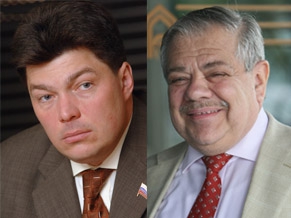|
Euroasian Jewish News

Michael Margelov and Michael Chlenov
|
EAJC Secretary General Participates In Meeting With Head of Russian International Affairs Committee
15.10.2010 On October 13, the Euro-Asian Jewish Congress (EAJC) Secretary General, Professor Michael Chlenov participated in a meeting between the Moscow delegation of the National Conference on Soviet Jewry (NCSJ) and Michaell Margelov, the Chairman of the International Affairs Committee of the Russian Federation Council.
In response to a question asked by NCSJ Chairman Richard Stone and Conference Executive Director Mark Levin on Iran's nuclear ambitions, Margelov stressed that Russia is sympathetic to the stated concerns of the problem, and that its recent political actions confirm this, demonstrating a clear political position.
The meeting also discussed an increase in the so called "new anti-Semitism" in Europe and attempts to delegitimize the State of Israel. The Russian politician pointed out that these problems are part of broader social phenomena that pose a threat to modern Europe. The participants expressed willingness for mutual support in confronting these negative phenomena.
The conversation also touched on issues ofthe Middle Eastern peace process and the role of American Jewry in "reseting" US-Russian relations. Having underscord that this role is great, Margelov then called for the development of the so-called "people's diplomacy," which, in his view, should lead to significant positive results.
Proessor Chlenov notes that the meeting was "very intense and, seemingly, to mutual benefit. It was constructive, and even though the parties did not avoid sensitive issues, the tone of the discussion remained consistently friendly."
|
